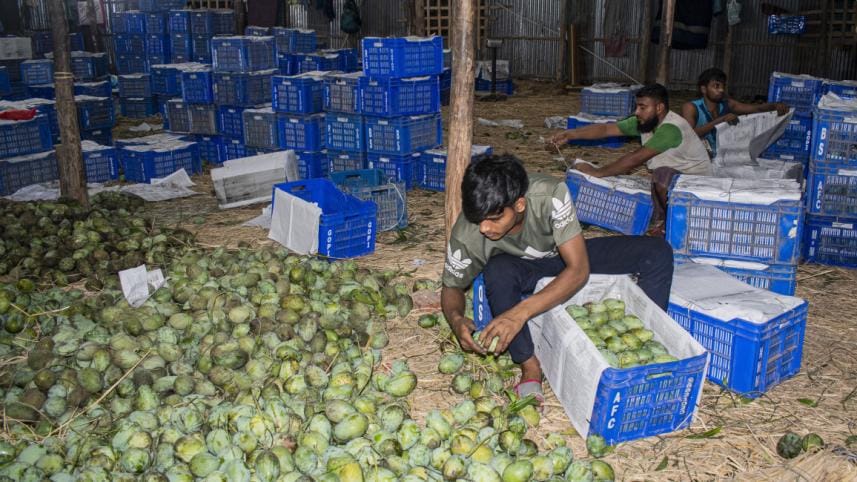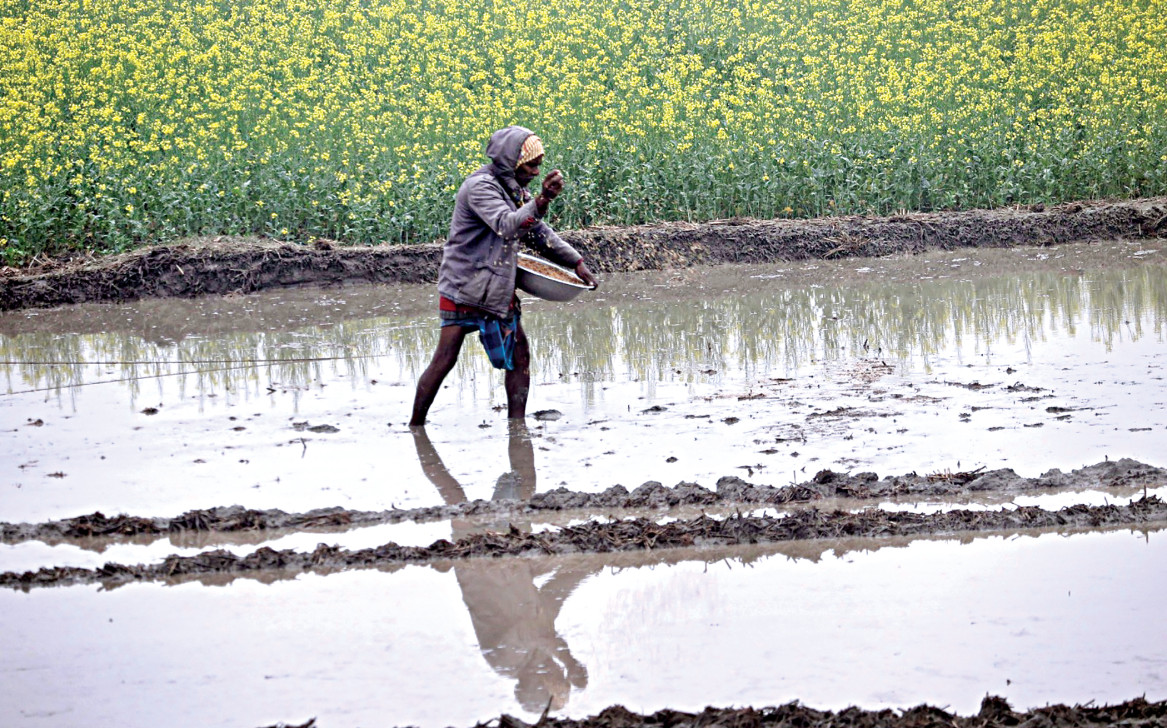Bangladesh’s mango boom at risk without urgent attention

Naogaon, a district historically renowned for rice cultivation, has emerged over the past decade as a leading mango producer, bringing prosperity to thousands. Yet, this success is now under threat from rising costs, systemic failures in local administration and the Department of Agricultural Extension (DAE).
Sohel Rana of Naogaon, a Master's graduate from Rajshahi University and a former journalist in Dhaka, returned to his village in 2013 to begin mango farming. Starting with just 12 bighas, he and his brother now cultivate nearly 200 bighas, producing more than 450 tonnes of mangoes this year with a market value exceeding Tk 1 crore. Recently, he obtained the Bangladesh GAP certificate for toxin-free mango farming and is now preparing to export his produce to Europe.
According to the DAE, mango cultivation in Naogaon has surged from under 6,000 hectares in 2015 to more than 30,300 hectares today. In 2024 alone, farmers in the district harvested around four lakh tonnes of mangoes, with a market value of Tk 3,000 crore. This shift has been driven largely by the fact that thousands of hectares of high, arid land across the district's nine upazilas are unsuitable for paddy cultivation due to declining water levels. Farmers who once earned a meagre Tk 7,000-8,000 per bigha from a single season of paddy—barely enough to cover production costs—are now reaping annual profits of Tk 50,000 to Tk 1 lakh from mango cultivation on the same land.
This economic pivot has triggered a dramatic socio-economic transformation. The expansion of mango orchards has not only boosted farmers' incomes but also stimulated local development. Land values around Sapahar town have reportedly risen 60 to 80 times over the last decade, spurring the establishment of quality private schools, colleges, and clinics, and further enhancing the quality of life.
Yet, beneath this success lies growing anxiety. Many farmers are considering abandoning mango cultivation due to sharply rising production costs. The once-lucrative profits from a bigha of Amrapali mangoes, which previously ranged from Tk 1 lakh to Tk 1.5 lakh, have been eroded by soaring expenses. Annual pesticide costs per bigha have more than doubled, from Tk 5,000-10,000 to Tk 25,000-30,000. Similarly, the cost of leasing a bigha of land for 12 years has jumped from Tk 10,000 to Tk 28,000.
A more pressing threat is the continuous onslaught of pests and insects. Reportedly, for the past three years, orchards have been plagued by an insect known as thrips, which blackens mangoes and renders them unsaleable at a desirable price. Farmers lament that no currently available pesticide or insecticide has proven effective against it.
On top of this, farmers face financial exploitation. When selling mangoes at Sapahar Bazar, they must pay Tk 80 per maund as a "depot fee" to depot owners, in addition to a Tk 6 toll per maund to the local district administration as khajna. Furthermore, this toll reportedly increases every year, according to the local upazila nirbahi officer (UNO) and the agriculture officer of Sapahar.
Additionally, the unethical practice known as dholan, which forces farmers to give an extra 10-12 kg of mangoes free for every maund sold, has been causing a significant financial loss. Although a directive abolishing this practice was issued on June 11 by the Rajshahi division commissioner, traders continue to ignore it. Combined with alleged syndicate activities and extortion by local political figures, this leaves farmers and traders in an increasingly vulnerable position.
The sector has made remarkable progress, with farmers now harvesting mangoes from March to September, and some varieties like Katimon being available year-round. However, systemic mismanagement in key production hubs and high cost of air freight threaten to undermine these achievements.
While Bangladesh produces 25-27 lakh tonnes of mangoes annually, exports remain disproportionately low, with only 2,167 tonnes shipped by August this year. The primary obstacle is the high cost of air freight to Europe—Tk 600 per kg—compared with Tk 150-200 per kg for competitors like India and Pakistan. Bangladesh's reliance on costly passenger flights instead of dedicated cargo aircraft significantly undermines its export potential. Experts suggest that introducing seasonal cargo flights could raise exports to at least 20 percent of national output, helping to secure the dreams of thousands of growers from collapse.
According to agricultural experts, up to 30 percent of Bangladesh's mangoes are lost annually at various stages. By contrast, countries such as Vietnam have built multi-billion-dollar export industries by processing mangoes into high-value products like jams, jellies, mango bars, powders, and pulp. With the right technology and training, the government could empower farmers and unemployed youth to convert this waste into both a new source of foreign exchange and employment.
Safeguarding the future of the mango sector requires urgent, multifaceted action. Local authorities must work alongside farmers to reduce production costs and curb exploitative practices. To minimise post-harvest losses, cooling vans and temporary cold storage facilities in the northern districts are essential. Most critically, the government must prioritise export infrastructure, such as establishing cargo facilities at Saidpur or Rajshahi airports, to make the progress of the sector sustainable in the long run.
Mostafa Shabuj is a journalist at The Daily Star.
Views expressed in this article are the author's own.
Follow The Daily Star Opinion on Facebook for the latest opinions, commentaries and analyses by experts and professionals. To contribute your article or letter to The Daily Star Opinion, see our guidelines for submission.




 For all latest news, follow The Daily Star's Google News channel.
For all latest news, follow The Daily Star's Google News channel. 

Comments